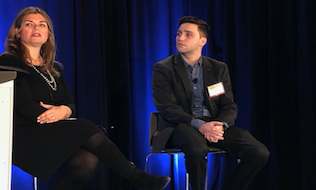

Since today’s cancer patients are much younger than they were in the past, doctors are treating patients who are actively working and are young parents, said Dr. Christine Brezden-Masley, oncologist and division head of hematology/oncology at St. Michael’s Hospital in Toronto.
“When you get a cancer diagnosis, it changes your entire life,” she said at a session at Benefits Canada‘s Employers Cancer Care Summit in Toronto on Feb. 27. “Patients tend to think this is a death sentence. Regardless of whether it’s an early stage cancer versus an advanced stage cancer, many patients are still working. So when we have these patients come to the clinic, if they’ve had early stage breast cancer, typically most of them have had surgery, and they’ve taken short-term disability.”
Read: An employee’s experience with the workplace during cancer treatment
At this point, they’ve started a conversation about therapies and whether or not they’re going to do chemotherapy, targeted therapy or combine with radiation, said Brezden-Masley. “So when we start talking about treatment for patients, then we start working with them. We got a social worker in our clinic who talks [with them] about whether or not they’re going to be able to work through treatment.
“You can imagine, they’re on short-term disability, and we spend a lot of time on insurance and disability forms because patients think they can work through it, but after you do the first or second treatment, it’s quite toxic therapy — especially chemotherapy — and they stop working. And many patients do want to still work, but because of the treatments it’s difficult for them to work.”
When some patients receive after-therapy, she said, many go on disability and don’t return to work, while others continue to work and may take a day off every three weeks after getting treatment.
Read: The employer’s role in being ‘a very strong motivator’ in cancer patients’ return to work
“I always recommend a graduated return to work. We tend to recommend three full days a week for the first four to six weeks, followed by adding another day, four days a week for the next six weeks, and then full time and that seems to work for many individuals, because it’s a slower return to work.”
When it comes to covering cancer therapies, Brezden-Masley noted patients rely heavily on insurance companies for the drugs they need. “There are also some studies we’ve done at our centre showing that the difference in survival, the difference in outcomes, are better when a patient has insurance, where we have the ability for newer therapies that we don’t necessarily have available with the public system.”
Employers have the power to actually get that drug for their employees, she added. “We’ve had that happen several times where the employee had a direct conversation with the employer saying, ‘This is a game changer for me, can we possibly get this drug for me? This is going to save my life.’ We’ve had some positive outcomes where this does happen.”
Read more coverage of the 2019 Employers Cancer Care Summit.
